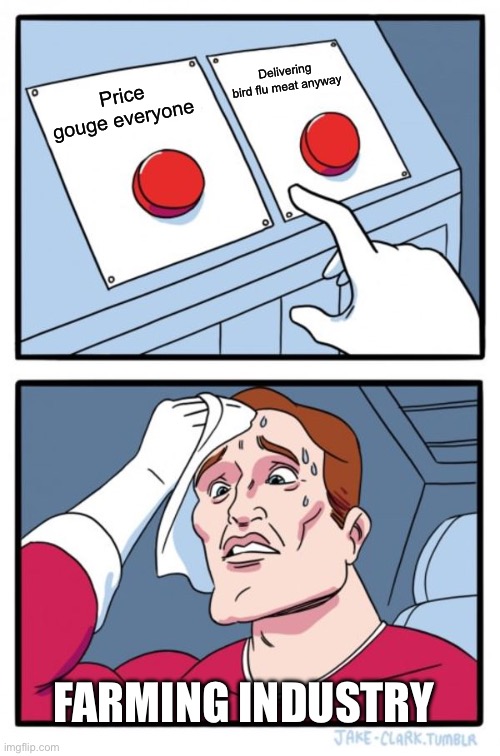deleted by creator
Well, if you consider farming torture, which I assume you do from the context, then four million chickens are about to stop.
Farming is plants. Ranching is animals.
The term “ranching” is only for some types of animals.
https://en.wikipedia.org/wiki/Ranch
A ranch (from Spanish: rancho/Mexican Spanish) is an area of land, including various structures, given primarily to ranching, the practice of raising grazing livestock such as cattle and sheep. It is a subtype of farm.
https://en.wikipedia.org/wiki/Poultry_farming
Poultry farming is the form of animal husbandry which raises domesticated birds such as chickens, ducks, turkeys and geese to produce meat or eggs for food.
“a” flock, the article says. One farm with millions of chickens?
That’s bananas
No, the article makes it quite clear that they are chickens, not bananas, despite being yellow, they are both quite different
Wow, you took a risky comedy swing and 13 people upvoted you so far.
Grats. That’s bananas.
B—a-n-a-n-a-s!
Yeah, each broiler house can hold ~20-50k chickens (depending on size). A few million chickens is a pretty large operation. Most farms around here have about 20 houses max.
…why is the place where chickens are raised and kept called a “broiler” house?
Meat chickens are called broilers, and egg chickens are called layers. Since they have been selectively bred for each specific purpose
hmmm what happens to all the male “layers”?
Same thing that happens to all the male broilers: meat grinder>dog food.
“Certified humane” doe
My understanding is that dog food is sometimes the answer, but I believe in some cases it’s actually more “cost effective” to either compost them or just throw them away. The system is broken.
Yup. Learning about animal agriculture was what made me vegan.
I went vegan for a bit for much the same reason. In all seriousness, good for you, taking responsibility for your footprint and the consequences of your dietary decisions.
More recently I’ve started keeping chickens and ducks (predominantly for eggs, inevitably one day for meat), and it’s given me additional insight into how animal agriculture can be done more responsibly and how we can integrate it into our communities and to enrich our land.
I think it’s great to foster awareness and agency in our food system. If being vegan works for you, I think it’s wonderful. If being vegetarian works for you, also great. I remember the first time someone self-righteously told me they are vegetarian and only eat eggs, and I asked them what they think happens to the roosters since they’re still born at a roughly 1:1 ratio. Introspection occurred. And if someone still Insists that eating tons of factory-raised meat is the only way, well then maybe they aren’t ready to think about it yet but hopefully I can plant a seed that will germinate later.
I appreciate the irony of your username.
Dang, thanks. That’s boggling
Did you notice it says ‘farm’? Not ‘farms’?
4 million chicken in ONE farm…!
It’s the American way. And it sucks.
I’m sure any and all chicken producers will use it as an excuse to keep increasing prices.

Those two don’t have to exclude each other! Think of the profits!!
Y’know eating less meat will help save the planet.
Because the water, power, and pollution expended would be less.
Aw come on, that’s a lot of wings, if we promise to cook them well, can you drop off some to my house?
Even aside from those particular birds, the shortage of chicken and eggs from bird flu has driven prices way up. Fewer wings to go around, so parties bid up what’s available.
Wikioedia: 2020–2024 H5N1 outbreak
Since 2020, global outbreaks of avian influenza subtype H5N1 have been occurring, with cases reported from every continent as of May 2024.
Here’s a graph showing chicken meat prices in the US since 2020:
https://fred.stlouisfed.org/series/APU0000FF1101
And here’s one showing eggs:
The Dispatch reported that the entire flock will be culled, with the remains isolated, to help prevent further spread.
Kind of unfortunate that they can’t figure out which ones got sick and cull just those. Would be nice to move towards chickens that are more-resistant to the flu, but that can’t happen unless the vulnerable ones are selected against in terms of survival. An across-the-board cull doesn’t do that.
Do we know the infection transmission method of this virus? Presumably if they knew they wouldn’t have to cull the whole facility right?
It’s the flu, a respiratory disease.
There may be other vectors (like raw milk), but airborne is going to be the main route for birds.
Might be the case that some places have multiple buildings and can keep some chickens away from others. I don’t know whether that’s enough isolation.
A study completed just recently shows that raw milk is infectious, at least in mice. HTST (high temperature, short time–this is the most common method used in the US but not most of the world) pasteurization mostly neutralized the virus but not entirely. Batch pasteurization neutralized it. Just FYI.









